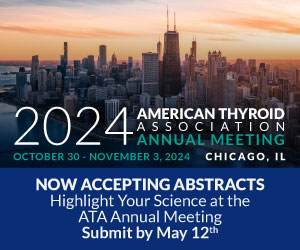Thyroid Experts Warn of Clinically Important Differences in Potency of FDA-Approved Levothyroxine Products
Generic bioequivalence data confirms medical societies’ concern about recently approved generic levothyroxine preparations
August 11, 2004
(FALLS CHURCH, VA)—Two organizations representing more than 5,400 clinical endocrinologists today warned patients taking thyroid medication, prescribing physicians, and pharmacists dispensing these drugs that clinically important differences do, in fact, exist between one recently approved generic levothyroxine preparation and the most widely prescribed brand of levothyroxine. The members of these organizations, the American Thyroid Association (ATA) and the American Association of Clinical Endocrinologists (AACE), specialize in treatment of hormonal disorders.
Levothyroxine is taken by more than 13 million Americans to treat an underactive thyroid, thyroid gland enlargement, nodules, or cancer. In June, the Food and Drug Administration (FDA) ruled that several generic levothyroxine preparations had the same clinical effect and safety profile as certain branded products. As a result, pharmacists may substitute a patient’s current levothyroxine preparation for another, sometimes without their physician’s approval.
According to bioequivalence data used to acquire FDA approval, one recently approved generic levothyroxine preparation (Sandoz Levothyroxine Sodium) is significantly more potent than the most widely used brand of levothyroxine (Synthroid®). Information from bioequivalence studies submitted to the FDA show that the new generic may be as much as one-eighth more potent (+12.5%) than the widely prescribed branded product.
Furthermore, levothyroxine is a drug known to have a narrow toxic-to-therapeutic ratio with significant clinical consequences of even minor excessive or inadequate dosing. Potential adverse events include symptoms, osteoporosis, atrial fibrillation, worsening of heart disease, preterm delivery in pregnancy, impaired fetal brain development, and high cholesterol.
“Unfortunately, this information confirms our concern that current FDA standards defining the equivalence of levothyroxine products are too lax,” said Carlos Hamilton, MD, AACE President. “Switching between two products could compromise the effectiveness of treatment and even result in serious side effects.”
The ATA and AACE have repeatedly expressed their concerns about the FDA’s recent decision to approve generic substitutes for levothyroxine products and its implications for the millions of Americans who depend on this drug. The societies have also made public their disappointment that the FDA made their decision before considering the input offered by clinical endocrinologists, the recognized experts who care for thyroid patients.
Both the FDA and the societies recommend that patients switching between levothyroxine products have repeat thyroid blood testing to be certain that the treatment dose remains effective and safe. “Under a policy of allowing generic levothyroxine substitution,” said Gregory Brent, MD, ATA Secretary, “more frequent thyroid function testing will be necessary. Regrettably, some patients and doctors will not even be aware of a change in preparation before adverse events occur.”
The ATA and AACE advise physicians caring for patients on levothyroxine therapy to —
- Alert patients that their levothyroxine preparation may be switched at the pharmacy,
- Encourage patients to remain on their current levothyroxine preparation when possible,
- Ensure that patients understand if they receive a new levothyroxine preparation that they will need to repeat a thyroid-stimulating hormone (TSH) blood test four to six weeks later to determine if they need further dose adjustment.
The societies also strongly urge pharmacists, pharmacies, and health plans to respect the wishes of patients and physicians who choose to continue the same levothyroxine preparation. They caution those who dispense and pay for levothyroxine products that there can be serious health consequences if patients and their doctors are not fully informed about the potential risks of substitution and the requirement for retesting if they choose to switch to another levothyroxine preparation.
The ATA’s previous statements related to this matter can be found on the ATA’s web site
Founded in 1923, the ATA is a professional society of 900 U.S. and international physicians and scientists who specialize in the research and treatment of thyroid diseases. The Association is dedicated to promoting scientific and public understanding of the biology of the thyroid gland and its disorders, so as to improve methods for their prevention, diagnosis, and management. The ATA fosters excellence in research, patient care, and education of patients, the public, and the medical and scientific communities while guiding public policy about the prevention and management of thyroid diseases.
AACE is a professional medical organization with over 4,900 members in the United States and 70 other countries. Founded in 1991, AACE is dedicated to the optimal care of patients with endocrine problems. AACE initiatives inform the public about endocrine disorders. AACE also conducts continuing education programs for clinical endocrinologists, physicians whose advanced, specialized training enables them to be experts in the care of endocrine disease, such as diabetes, thyroid disorders, growth hormone deficiency, osteoporosis, cholesterol disorders, hypertension and obesity.
# # #
See related articles on Bioequivalence of Levothyroxine



